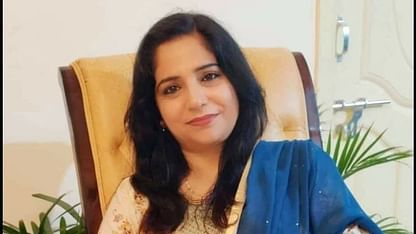 Hina Rizvi Haider- it may not be a very known name on the Urdu Mushairas circuit, but it sure is a much loved and respected name in the hearts of all those who love reading good Urdu poetry. As a teenager, Hina, started her poetic journey by composing nauhas, (elegies written and recited as a tribute to the Martyrs of Karbala who sacrificed their lives to uphold justice) but over the years she been passionately lending her voice to all social issues and causes. Tyranny, violence, discrimination, gender inequality, name it and Hina has a sensitivity dealt with the issues in her nazams for nearly four decades now.
Hina Rizvi Haider- it may not be a very known name on the Urdu Mushairas circuit, but it sure is a much loved and respected name in the hearts of all those who love reading good Urdu poetry. As a teenager, Hina, started her poetic journey by composing nauhas, (elegies written and recited as a tribute to the Martyrs of Karbala who sacrificed their lives to uphold justice) but over the years she been passionately lending her voice to all social issues and causes. Tyranny, violence, discrimination, gender inequality, name it and Hina has a sensitivity dealt with the issues in her nazams for nearly four decades now.
As the month of Muharram commensurate from 9th August this year this seems absolutely the most appropriate time to speak to this Sahibey bayaaz (one who writes dirges and alleges). Mother of two grown-up off springs her husband is in the judicial service. This happy homemaker is an example of nafsey mutmayena (contented person, who has control over her nerves). In a departure from the normal interview format at the end of this interview I will share some of Hina’s poems and let the readers be the judge of her poetic caliber.
Q: Tell us about your childhood and how you developed the love for writing.
A: You can say that I have inherited and imbibed poetry, shairi is in my blood. My nana (maternal grandfather) Chaudhary Itrat Husain, ‘Aashiqui’, was a renowned and ‘sahib-e-diwan’ poet. My uncle Chaudhary Qamar Hussain also wrote poetry. Though both my parents did not write poetry but they were very fond of it and regularly attended Mushairas and I tagged along with them to these enlightening mehfils. My mother did her PhD under-celebrated poet Waseem Barelvi. Also there were nashists (poetic symposium) organized in house in which legendary poets like Rahat Indori recited their kalaam.
Q: Tell us about composing nauhas and salaam.
A: It is true that very early in life I started writing nauhas and salaam to pay my tributes to Hazrat Imam Husain and the 72 martyrs . I composed the rhythm for these pieces and I recited them myself at majlises. Appreciation from elders boosting my morale and over the years I started writing them every year on Muharram. Quite a few of the Anjuman’s (groups) recite my verse, and it makes me very happy and thankful to Allah that he gave so much power to my pen that I can write on these most revered of humans. Maybe it is because of this mindset that I have never felt very comfortable writing romantic poetry but lends my pen to causes and issues.

Q: Pandemic has shrunk the world. Mushairas have shifted from local to global. What do you have to say about this “from stage to online platform” shift.
A: I am absolutely delighted. This is one aspect of the pandemic that I simply adore. I have always been a little hesitant in participating in mushiaras on stage, but online mehfils are fine. Sitting in my drawing-room I have traveled to distant lands and shared my poetry. This global participation is especially a blessing for female poetesses.
Q: How was your love of writing poetry received by your husband and your in-laws.
A; They love it and in fact, they are the ones who goad me on whenever I slacken down. Mine was an arranged marriage, I was to adopt an entirely new environment and people. As I prepared to leave my familiar surroundings, I carried with me one of my most prized processions -the diary of my share. To my surprise, I discovered that my husband too wrote poetry. He not only appreciated my verse but also encouraged me to continue nourishing this god gifted talent. Many evenings we spend sitting together reciting our poems for each other. It kind of connected a happy bond that Mashallah has only got strengthened with time.
Also Read : WEEKEND RENDEVOUS: Survival possible with ethics intact assures
My in-laws, including my mother-in-law and sister in law have also been very encouraging. They coax me to write and then insist that they become my first listeners. I am truly lucky to have such people in my life who inspire and appreciate me so much. Now my children have joined this group. They appreciate what I write and are proud of my talent.
Every Muharram I used to compose nauhas and recite them at majlises but for the last two Muhurram pandemics has stopped public gatherings. But this year I sure will compose and recite them maybe online majlises.
Q: Did the pandemic prove to be a boon for your poetry writing ? Tell us about your lockdown creativity.
A; The first wave of the pandemic did motivate me to compose poetry. But the devastation it created in the second e wave made me completely withdraw in my shell. I was so affected with all-round human misery, loss of human life the helplessness, and the pain that my pen just froze.
However, I must say it was a boon in the way that for the first time I participated in online mushairas and suddenly started enjoying it.I suddenly stepped into a much bigger world and I truly enjoyed this exposure.

Q: Tell us about your first book of poems Rangey Hina.
A: It is a my poetic diary from early compositions till date which were transferred into a book. It was done by a relative and printed in a hurry. As much as I appreciate his enthusiasm and appreciation I would like to work on the reprint with extra effort and make it more effective..
Q: Does poetry comes to you all the time or is there any particular time of the day you write?
A: I suppose it just happens. The good thing is that I can compose very fast. Like a nazam take barely 15 minutes. But this only happens when my mind gets signals to write. It sort of seems coming from inside. All I have to do is to put ink to these thoughts.
Q: Tell us about some of your favorite poems apart from your compositions on Muhurram
A: I have written on Nirbhaya, the plight of migrant laborers, on children being mercilessly gunned down in a Pakistani school and of course my all-time favorite on Bintey Hawa.It encompasses all the issues and taboos that concerns a woman. I feel I have done justice to my gender.
As promised in the beginning we hereby share some of Hina’s poetic works beginning with salaam which is dedicated to Hazrat Abbas, the brave grandson of Prophet Mohammed while he attempts to bring water for the children from the Eupharates river which was guarded and access to water denied for his family.
नज़र से तशना लबी की उतर गया दरिया
जरी की पाओं की ठोकर से मर गया दरिया
نظر سے تشنہ لبی کی ٗ اتر گیا دریا
جری کے پاٶں کی ٹھوکر سے مر گیا دریا
जो इब्ने साक़ी ए कौसर के लब न छू पाया
तो उनकी क़ब्र पे आकर ठहर गया दरिया
جو ابنِ ساقیء کوثر کے لب نہ چھو پایا
تو ان قبر پہ آ کر ٹھہر گیا دریا
उठाया चुल्लू में हैदर के शेर ने जिस दम
सिमट के दस्त ए मुबारक में भर गया दरिया
اٹھایا چلو میں حیدر کے شیر نے جس دم
سمٹ کے دستٍ مبارک میں بھر گیا دریا
उतरते देख के जिस्मों से सर सरे साहिल
चमकते नेज़े की गर्दिश से डर गया दरिया
اترتے دیکھ کے جسموں سے سر سرے ساحل
چمکتے نیزے کی گردش سے ڈر گیا دریا
जहां पे मशक ए सकीना से गिर गया बाहर
वहां से शर्म से अब दूर तर गया दरिया
جہاں پہ مشکٍ سکینہ سے گر گیا باہر
وہاں ہاں سے شرم سے اب دور تر گیا دریا
‘हिना’ है दुनिया की वाहिद ज़मीने करबोबला
के जिस पे प्यास तो ज़िंदां है मर गया दरिया
حنا ہے دنیا کی واحد زمین کرب و بلا
کہ جس پہ پیاس تو زندہ ہے مر گیا دریا
 Jubilee Post News & Views
Jubilee Post News & Views




